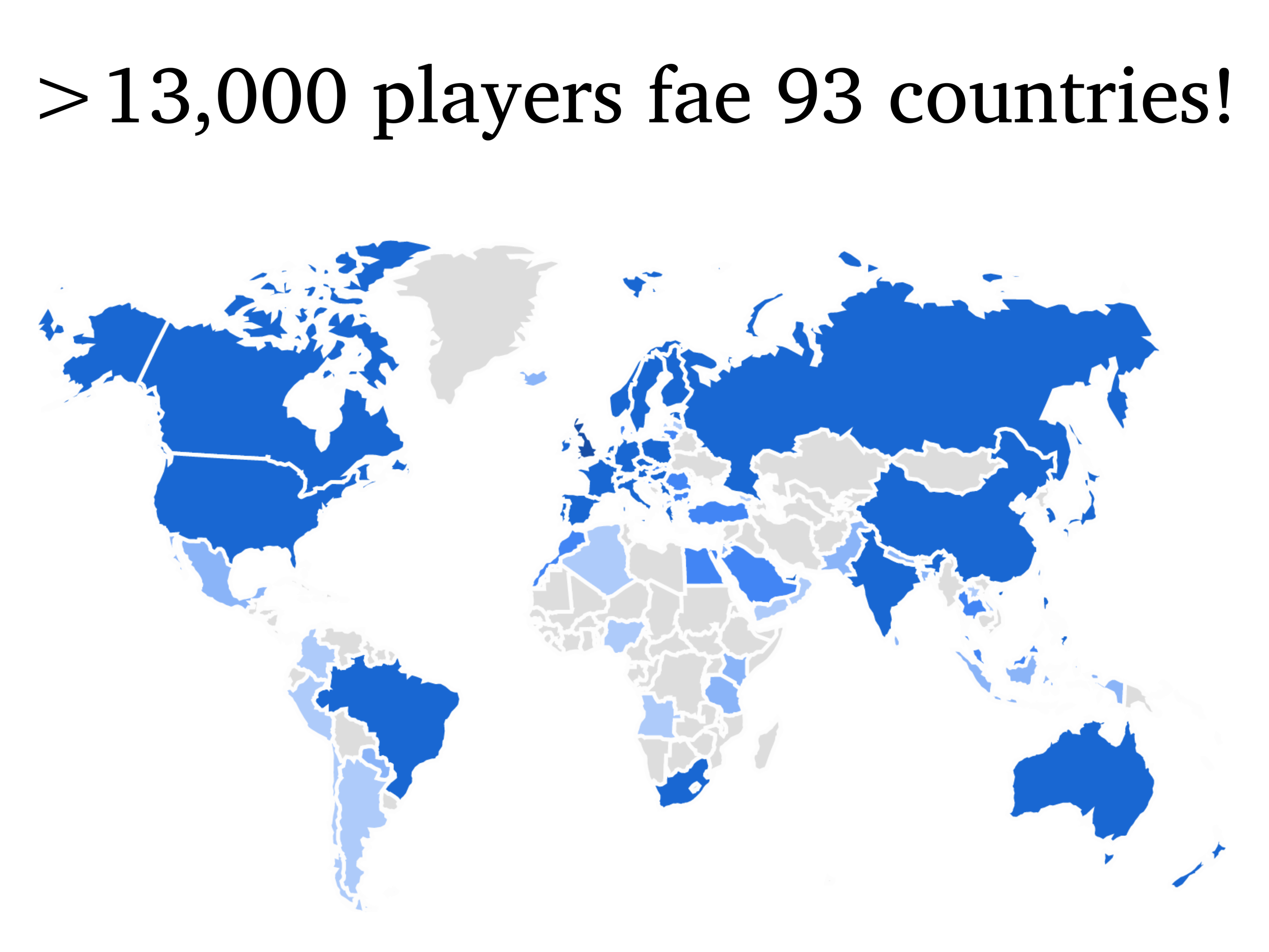Wirdle solutions week 12
We're pleased to announce that as of today the Shaetlan Wirdle has had more than 13,000 players from 93 countries. Here are the solutions for this week! Scroll for one word at a time to get the correct answer, it's meaning, and the history of the word. Last you'll find the main references we use for the etymologies, and the latest map of players. You'll find the principles of our spelling system at https://www.iheardee.com/english/spelling-in-shaetlan (or in our linktree).
✅
It's important to remember that "Old English" was never a monolithic language, but rather is a cover term for four distinct North Sea Germanic varieties. The direct ancestor of Scots was Northumbrian Old English. The direct ancestor of English was Mercian Old English. But most of the existing data comes from West Saxon Old English. Wherever possible we have given the Northumbrian Old English forms, since the main ancestors of Shaetlan are Norn and Scots (not English), with a lot of Dutch/Low German influence.
✅
With thanks again to Julie for hatching the idea and to Andrew for making it possible! 🤗
flans plural of flan ‘squall; sudden gust of wind’
History: the Old Scots flan ‘a blast’ is attested from c.1475. It comes from Old Norse flana ‘to rush, fly, flutter about’ (and is still found in the Scandinavian languages, like Da. flane ‘id.’, Sw. flana ‘flutter about; be silly, fool about’). The Old Norse verb entered Norman as flan(n)er which is the origin of the French flâner ‘to wander around, loiter, etc’. It ultimately derives from Proto-Indo-European *pleh₂- ‘flat, broad’.
yoags plural of yoag ‘horse mussel’
History: this word is Orkney and Shetland specific. It comes from Old Norse aða ‘horse mussel’, which is still found in Icel. aða, Far. øðuskel, No. oskjell (all meaning ‘horse mussel’). Any further etymology is obscure.
greth ‘urine’
History: the Old Scots gra(i)th(e), gre(a)th ‘to prepare, make ready (in various senses)’ comes from Old Norse greiða ‘to make ready, prepare, arrange, etc’, which in turn comes from Proto-Germanic *garaidijaną ‘to prepare, make ready, arrange’, ultimately from the Proto-Indo-European root *h₂rey- ‘to count, order’. Here the semantic shift seems to have gone from ‘prepare’ to ‘steep/wash in urine’ to just ‘urine’.
parks plural of park ‘field’
History: the Old Scots park comes from Old French parc ‘livestock pen’, which in turn descends from Medieval Latin par(ri)cus ‘fenced in enclosure; game parc; fence’. That in turn is a loan from Frankish *parrik/parruk ‘enclosure, pen’ which descends from Proto-Germanic *parrukaz ‘enclosure, fence’. But any further etymology is unknown. The meaning ‘an enclosed piece of ground for pasture or cultivation; a field, a paddock’ is attested since 1393, but is now mainly found northern English and Scots varieties.
graav ‘sea bottom, esp. sediment on sea bottom’
History: this is originally a fisherman’s taboo word which has entered the general lexicon with its taboo word meaning. The original meaning was ‘grave’, which is a pan-Germanic word. Old Scots gra(i)f(fe), greaf ‘a grave, tomb’ is attested from 1400. It comes from Old English græf ‘grave’ which descends from Proto-Germanic *grabą ‘grave’. That itself is a nominal derivation of *grabaną ‘to dig’, which ultimately comes from the Proto-Indo-European *gʰrebʰ- ‘to dig, scratch, scrape’.
traep ‘to argue persistently; scold, rebuke’
History: the Old Scots threip ‘argument’ might be attested as early as 1296. It descends from Old English þrēapian ‘to rebuke, reprehend’, which comes from Proto-Germanic *þrawō ‘torment, suffering’ and is a nominal derivation of *þrawjaną ‘to torment, injure, exhaust’ which in turn comes from Proto-Indo-European *trouH-eh₁- ‘to beat, wound, kill, torment’. Now it’s now mainly found in the northern dialects and in Scots.
vexed ‘annoyed, distressed’, past participle of vex ‘annoy, distress, disappoint’
History: the Old Scots vex ‘to fret’ is attested from ca 1500. It’s a loan from Old French vexer ‘to harm; to hurt (especially by torture)’, which derives from Latin vexāre ‘to harass, annoy; trouble (with violence); persecute’. It ultimately comes from the Proto-Indo-European root *gʷog- ‘to shake, swing’.
References
Bokmålsordboka. 2022. Språkrådet og Universitetet i Bergen. Available at http://ordbøkene.no.
Christie-Johnston, Alastair & Adaline Christie-Johnston. 2014. Shetland words. A dictionary of the Shetland dialect. Lerwick: The Shetland Times.
de Vaan, Michiel. 2008. Etymological dictionary of Latin and the other Italic languages. Leiden, Boston: Brill
de Vries, Jan. 1977. Altnordisches etymologisches Wörterbuch. Leiden: Brill.
DSL Online. 2002. Glasgow: The University of Glasgow. Available at https://dsl.ac.uk/.
Heggestad, Leiv, Finn Hødnebø & Erik Simensen. 1993. Norrøn ordbok. 4th edn of Gamalnorsk ordbok. Oslo: Det norske samlaget.
Hellquist, Elof. 1993. Svensk etymologisk ordbok. 3rd edn. 2 Vols. Malmö: Gleerups.
Jakobsen, Jakob. 1985 [1928]. An etymological dictionary of the Norn language in Shetland. Lerwick: The Shetland Times.
Kroonen, Guus. 2013. Etymological dictionary of Proto-Germanic. Leiden: Brill.
Lehmann, Winfred P. 1986. A Gothic etymological dictionary. Leiden: Brill.
Macbain, Alexander. 1911. An etymological dictionary of the Gaelic language. Stirling: Eneas Mackay.
Marwick, Hugh. 1929. The Orkney Norn. Oxford: Oxford University Press.
Matasović, Ranko. 2009. Etymological dictionary of Proto-Celtic. Leiden: Brill.
Nielsen, Niels Åge. 1995. Dansk etymologisk ordbog. Ordenes historie. 4th edn. København: Gyldendal.
Nynorskordboka. 2022. Språkrådet og Universitetet i Bergen. Available at http://ordbøkene.no.
OED Online. 2021. Oxford: Oxford University Press. Available at https://www-oed-com.ezproxy.uni-giessen.de.
Orel, Vladimir. 2003. A handbook of Germanic etymology. Leiden: Brill.
Pfeifer, Wolfgang (ed.). 1997. Etymologisches Wörterbuch des Deutschen. München: Deutscher Taschenbuch Verlag.
Pokorny, Julius. 1994. Indogermanisches etymologisches Wörterbuch. 3rd edn. 2 Vols. Tübingen: Francke Verlag.
Torp, Alf. 1919. Nynorsk etymologisk ordbok. Kristiania: Forlaget H. Aschehoug & Co.
Zoëga, Geir T. 1896. English-Icelandic dictionary. Reykjavík: Sigurður Kristjánsson.
Zoëga, Geir T. 1922. Icelandic-English dictionary. 2nd edn, enlarged. Reykjavík: Sigurður Kristjánsson.

